By: Hope Middlebrook
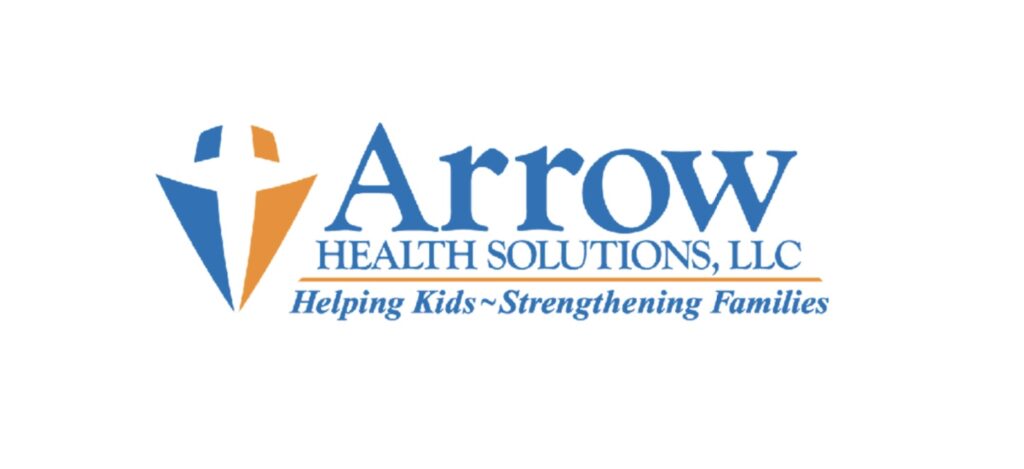
There is always something exciting going on in the foster care world! And fall is especially busy. If you’ve been wanting to get plugged in, now is the time to hop in!
Arrow is a child-placement agency for foster kids. In McLennan County alone, there are around 800 children in the foster system. When there are not enough homes for them, they are referred to as a CWOP (child without placement) and are often housed in CPS conference rooms or hotel rooms. Here at Arrow, we believe the best place for a child to grow up is in a family. We work each day to make sure that every foster child is placed in a loving and healthy home, one where they can grow and heal!
Does this sound like something you might want to know more about? Join us for our next Orientation, this October 26th at 6 pm. This low commitment Zoom class will tell you everything you need to know about foster care and Arrow.
Need more information first? Arrow Child and Family is pleased to announce we will be partnering with Nightlight Christian Adoptions for a monthly book club. Our kickoff meetup is at 1 pm on October 23rd at Glory Bell Coffee. We will be discussing the first half of Foster the Family.
Additionally, Waco’s Families and Foster Care Coalition will be hosting a multi-agency informational meeting on November 2nd. We would love to see you there!
It’s a great time to learn more about foster care! Contact Hope Middlebrook at [email protected] to learn about how to get involved. Whether you want to be a foster parent or get more information on how to donate to the kids in our community, we can all do something!
ABOUT
Arrow Child and Family Ministries is a child-placement agency committed to finding quality, loving homes for foster children. They were established in 1993 and have been a leader in the field ever since.
Be sure to tune in to the “Act Locally Waco” podcast! In their latest episode, they delve into the state of foster care in the city of Waco, shedding light on crucial insights and discussing ways you can make a positive impact. For a full and informative interview on Waco’s foster care system, featuring Hope Middlebrook from Arrow Child & Family Ministries, check out the podcast here! It’s an excellent resource to learn more about this important community initiative.
SOCIALS
Facebook:
https://www.facebook.com/arrowcfm https://www.facebook.com/groups/ArrowWaco
Instagram: https://www.instagram.com/arrowcfm/?hl=en Website: https://www.arrow.org/
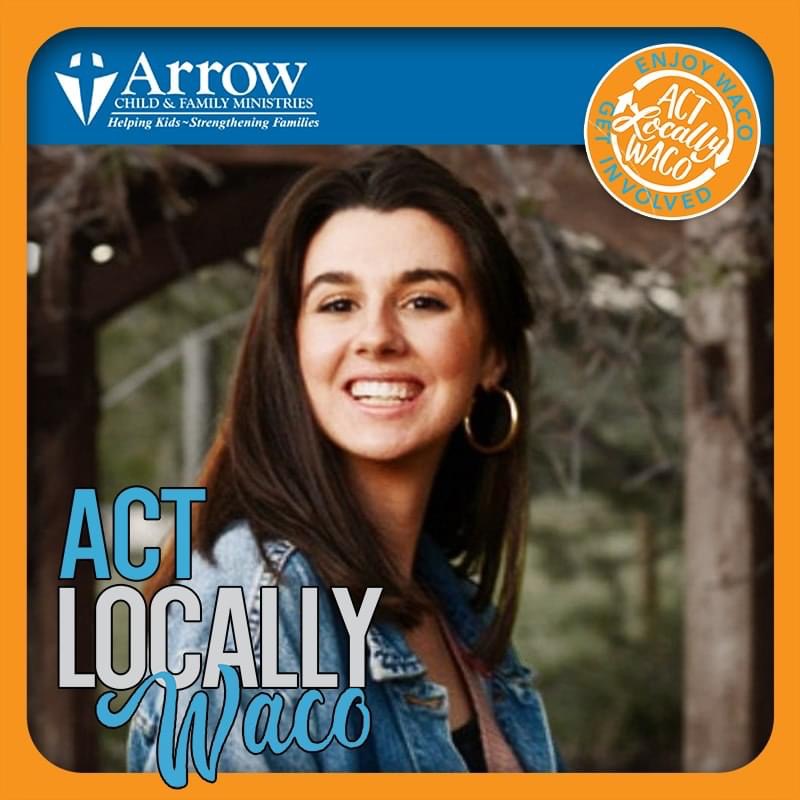
WHO: The Salvation Army Waco Corps, Local Waco Walmart locations, Waco HEB Stores

WHAT: The 2023 back-to-school campaign encourages shoppers to purchase and donate school supplies and other requested items at the Salvation Army collection bins at Walmart on Franklin and in Hewitt from August 4th to August 6th. Additionally, all Waco HEB stores will be collecting Back to School donations for school supplies, which will be purchased for distribution by The Salvation Army. The aim is to provide new school supplies to 300-500 students in the McLennan County community, ensuring they have the necessary materials for the upcoming school year.
WHY: The collaboration between The Salvation Army and local communities, along with supporters like HEB and Walmart, helps meet the needs of people and serves over 23 million Americans annually through social services, aiding communities in overcoming poverty and economic hardships. This joint effort ensures children in Waco and surrounding cities have the school supplies they need for academic success.
WHEN: School supply collections at Walmart will take place on August 4th, 5th, and 6th, 2023, from 10 am to 6 pm. The HEB Back to School Event will be ongoing throughout August, including curbside purchases.
WHERE: Live event at Walmart on Sun Valley in Hewitt, scheduled for August 5, 2023, from 10 am to 6 pm. Interviews and photo opportunities can be arranged upon request before the event.
By Andrea Zimmerman
It’s not news to anyone that foster care is in crisis. It seems we’ve become accustomed to this reality and even somewhat apathetic to it, probably because it is so overwhelming and simultaneously kept behind the doors of state offices.
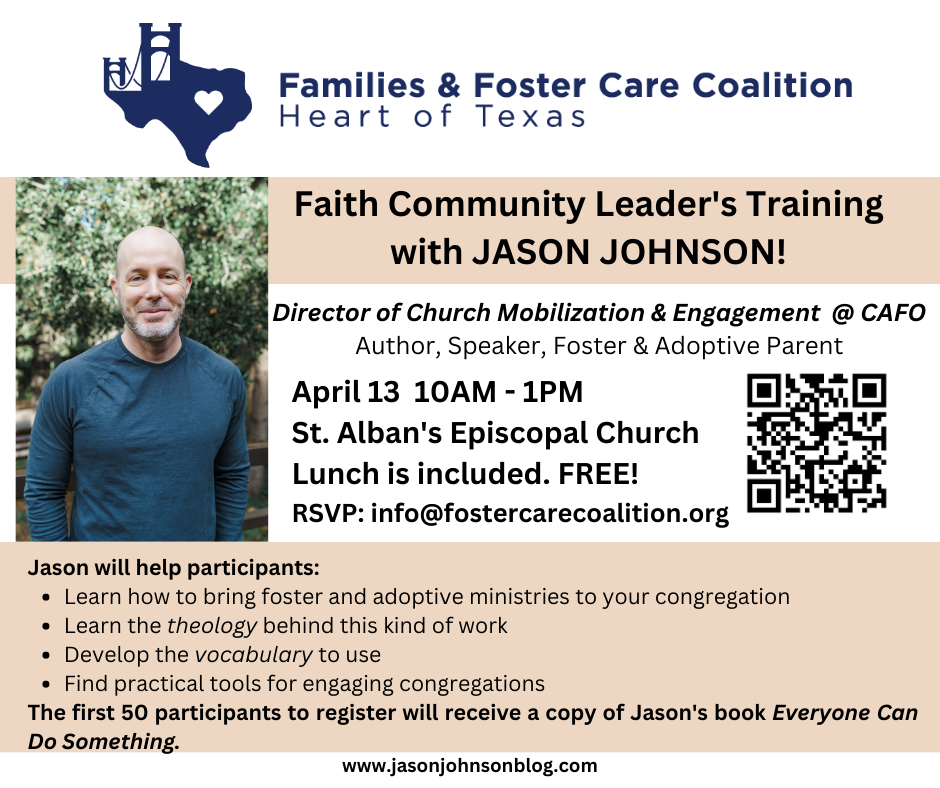
The State of Texas is changing this and has mandated that local communities confront the crisis among vulnerable families in their own communities by privatizing foster care with what is called Community Based Care. Under this model, CPS will handle investigations and removals, then a private agency will handle placements and case management.
Consequently, without the state’s placement network, children will no longer be sent to other communities with more resources and more foster homes. If you are asking, “Wait, we send children away?” The answer is “yes.” We send away A LOT of children and youth due to a lack of kinship support, foster homes, youth homes, and resources for complex needs.
In fact, of the approximately 450 children and youth whose cases originated in McLennan County, half are sent to other areas. Under Community Based Care, this will no longer be possible and our local community is expected to increase our capacity in every way to care for these children.
While this is a stunning and overwhelming change, if our community rises to this occasion and works together to care for our own children, keeping children close to home is proven to provide better long-term outcomes for both the child and the family of origin.
Keeping children and youth in their own communities means they remain close to their family of origin; they may stay in the same school and faith community and can maintain consistency in medical resources, not to mention their social structure. Older youth retain employment, schooling, and their support system. Proximity supports reunification efforts and enables the foster or kinship parent to provide support to the family of origin, as well.
This is a tall order for our community. We have a network of support in foster care, but we are stretched thin and have limited resources. We need help! We need more human and financial resources to make this work.
This doesn’t happen overnight, but the Families and Foster Care Coalition began efforts about a year ago to gather our resources and assess the landscape for this change. The needs are great, and we are working hard to increase capacity in our community.
One area that would help is the involvement of the faith community. While becoming a foster parent is a rare and unique call, becoming involved in the supportive work of foster care is a way the faith community could help in this crisis.
Kingwood Methodist Church, just outside Houston, shared a beautiful story of their work among youth in foster care in their community (watch or listen here). In that story, you can hear about Jason Johnson, who helped prepare their congregation for this work.
Jason will come to our Waco community April 13 to lead a faith congregation leader’s training workshop. This session will help equip leaders in the faith community with practical tools for starting the work of foster care in their congregations. This event is free, and childcare and lunch are provided. RSVP here.
This training workshop is the first step in preparing for this change headed our way. We would love for you to join us!
For more information about the Families and Foster Coalition, please visit:
Website: fostercarecoalition.org
Email: [email protected]
Find us on Facebook: Families and Foster Care Coalition
Find us on Instagram: ffcc_heartoftx
Andrea Zimmerman is coordinator of the Waco Families & Foster Care Coalition.

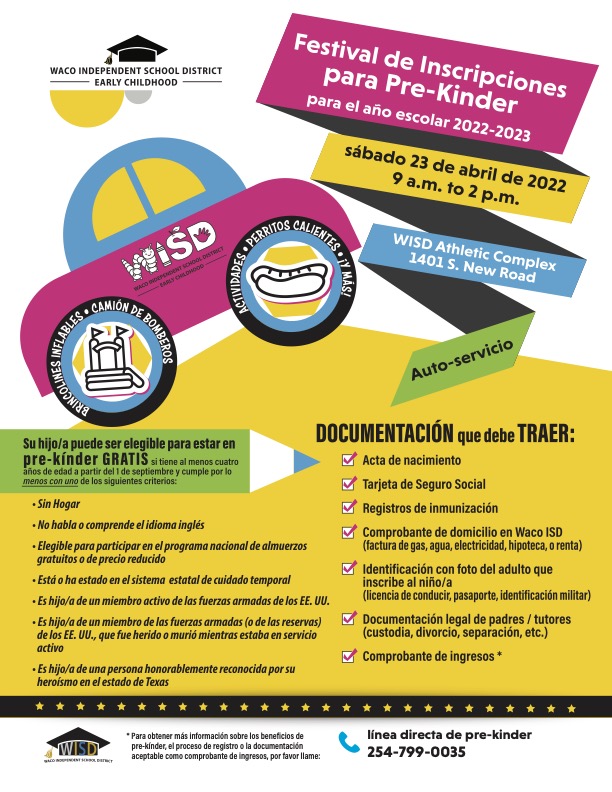
You child may be eligible for free prekindergarten! Want to learn more? Check out the above flyers and attend the WISD Pre-K Registration Roundup Fun Fest on April, 23!
By Chelsea Sanchez
As a child, I intuitively understood that the “negative” behaviors of others were often a response to feelings of fear and pain. I cannot recall anyone explicitly sharing this information with me, yet this basic understanding of human behavior informed how I decided to treat others — with kindness, compassion, and hope.
Furthermore, this basic understanding of human behavior became the lens through which I viewed the world. I was so in tune with how pain impacts people that I grew up to become a social worker. Because, what else was there to do but to learn how to guide people through pain to find hope and healing?
If I could use one word to describe my life over the last eight years that word would be “advocacy.”
— I have helped children and youth overcome barriers to their education, such as packing backpacks with snacks and canned goods to ensure these students have food to eat during weekend breaks from school.
— I have helped individuals displaced by war overcome barriers to their wellbeing, such as ensuring they have access to food, clothing, shelter, and other basic necessities.
— I have helped survivors of human trafficking overcome barriers to their mental health, such as providing transportation to and from therapy and counseling sessions.
And now, my advocacy efforts aim to support children who have experienced abuse and neglect.
To those of us working in child welfare, 47,913 is more than just a number. It represents the children in foster care throughout Texas.
Children deserving of a life without experiences of abuse and neglect.
Children deserving of a safe, nurturing, and permanent home.
Children deserving of a support system advocating for their best interests.
CASA of McLennan County aims to be part of that support system. Our mission is to provide a trained volunteer — a Court Appointed Special Advocate — for every child who has experienced abuse and neglect in the county, so that these children may ultimately thrive in safe, nurturing, and permanent homes.
A Court Appointed Special Advocate is an individual acting in the best interest of children who have experienced abuse and neglect.
Our best-interest advocacy efforts are guided by five principles:
- LEARN all we can about the children and their families.
- ENGAGE with children during regular visits.
- RECOMMEND what is in the best interests of the children we serve.
- COLLABORATE with others to ensure that necessary services are provided and are in the best interests of the children.
- REPORT what we have learned and observed to the court.
Effective advocacy also includes an understanding of human behavior and trauma and its effects.
Children who have experienced abuse and neglect are survivors of complex trauma, which refers to exposure to and long-term effects of multiple traumatic experiences.
Another word often used to describe trauma is “wound.” Survivors of complex trauma have complex wounds that cannot be healed with a band-aid. These wounds shape the way children view themselves, others, and the world. These wounds also shape the way children think and behave.
Some of the long-term effects of trauma include an inability or difficulty to develop healthy, supportive relationships; impairment of the brain and nervous system; difficulty identifying, expressing, and managing emotions; dissociation; being more likely to engage in high-risk behaviors; and difficulty with reasoning, problem-solving, or paying attention.
When children demonstrate the effects of trauma, their behavior is often categorized as “bad” or “negative.” However, these are normal reactions to abnormal experiences. Children often do not know how to talk about their traumatic experiences. (Honestly, most adults have difficulty with this, as well.) As a result, children communicate through their behavior.
Our role as CASA advocates, therefore, is to demonstrate compassionate understanding of the experiences and emotions behind the behavior. Our role is to see the person behind the behavior. Only then can our advocacy efforts truly be in the best interests of the children whom we serve.
Those 47,913 children in foster care throughout Texas deserve kindness, compassion, and hope.

Chelsea Sanchez, program director for CASA of McLennan County, is a first-generation high school and college graduate. She is a Baylor University graduate and Licensed Master Social Worker with over seven years of experience working with at-risk children, youth, refugees, and survivors of human trafficking. She has a diverse set of skills and experience including crisis intervention, case management, trauma-informed care, and training/management of volunteers, employees, and interns. She has provided various presentations and training sessions for conferences and coalitions.
The Act Locally Waco blog publishes posts with a connection to these aspirations for Waco. If you are interested in writing for the Act Locally Waco Blog, please email Ferrell Foster at [email protected].
By Ferrell Foster
Families come in a variety of forms, and they serve varied personal and social services. One of the key functions of family is to nurture the growth and development of children by providing for a child’s basic human needs.
We all know, however, that some families become unable to provide the needed care for a child. When that happens the state steps in to protect the children, as it does in other circumstances where vulnerable persons are at risk.
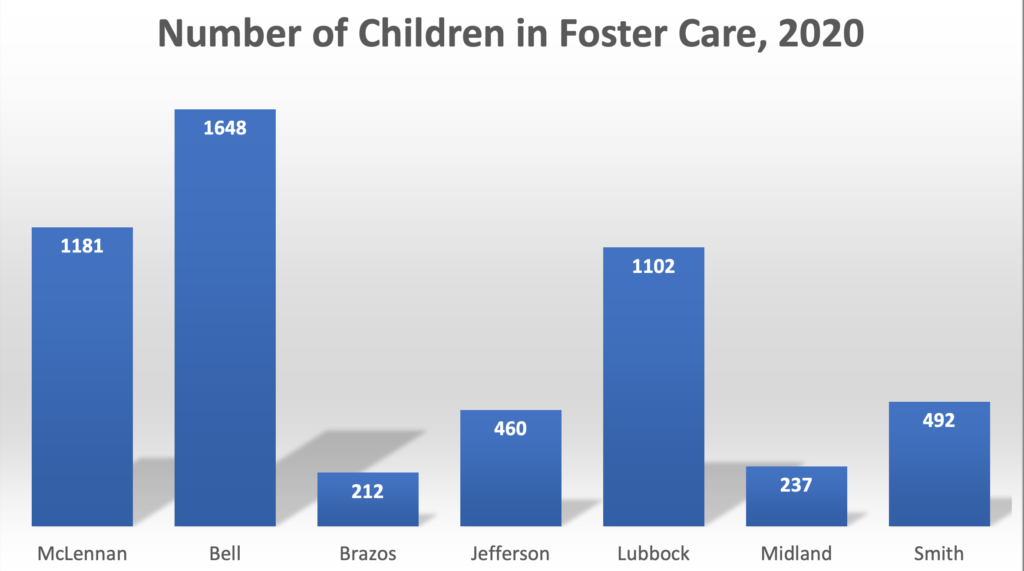
A number of things can happen when the state intervenes; one is by arranging foster care — a place to provide needed care to a child for a time. Kids may be placed in a number of possible settings — a relative’s home, a licensed foster home, or residential psychiatric care.
Foster care placements have been rising in many counties in Texas. In 2020, 1,181 McLennan County children were placed in foster care, a figure which has risen steadily over the past 10 years; there were 465 placements in 2011. These numbers reflect all children in the varied types of housing.
The placement number reflects the number of children in care at the beginning of the year and those who enter care during the year, said Anna Futral, executive director of CASA of McLennan County. On any given day there are about 700-800 McLennan County children under state supervision with relatives, licensed homes, or other residential facilities.
The rise since 2011 is staggering and should get our attention. Yes, our population has risen, but it has not nearly tripled, as have the placement numbers. This tells us that a lot of families are struggling to care for their children.
Are we any different from counties of similar size?
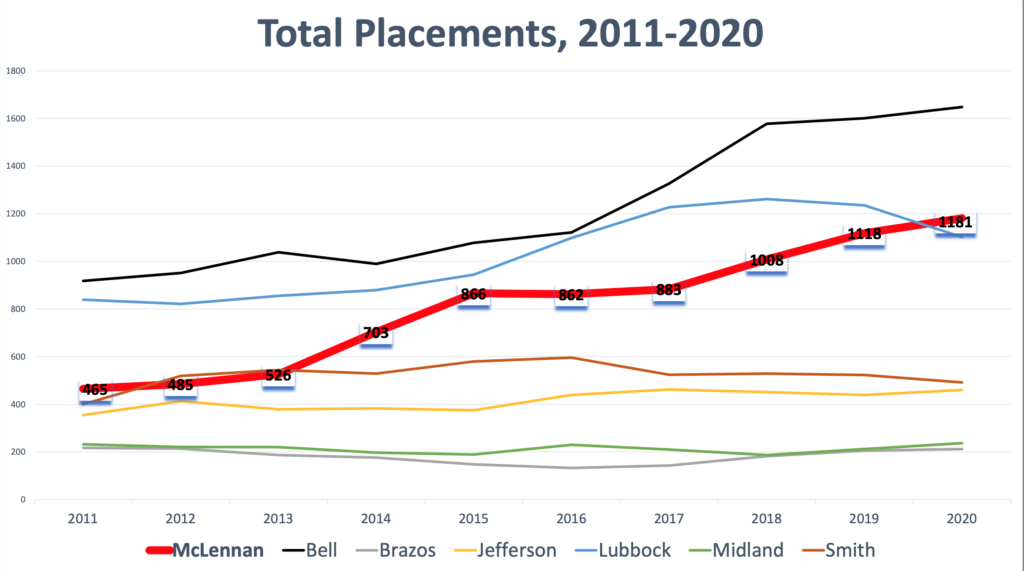
The rate of placement in McLennan County is 18.36 per 1,000 children. That means 1.8 percent of our children are needing state-supervised care. This is a higher rate than in similar counties — 16.5 per 1,000 in Bell, 4.21 in Brazos, and 7.6 in Jefferson.
The need for care points to a challenge on the family-of-origin side of the equation, but there is also a challenge on the foster care side. Last year, there were 17 licensed homes for foster care in our county. These homes typically house no more than two children.
“Many/most kids do get placed with relatives, which is a good thing,” Futral said, “but for those that don’t have safe relatives to be placed with, they are placed in licensed foster homes. But with so few licensed homes here locally, many children end up outside of McLennan.”
This resulted in only 35% of McLennan County children being placed in the county in 2020. That’s pretty consistent with other similar counties — 36% in Bell County, 35% in Brazos, and 33% in Jefferson. Lubbock County, which is similar in size, placed 51% within their county.
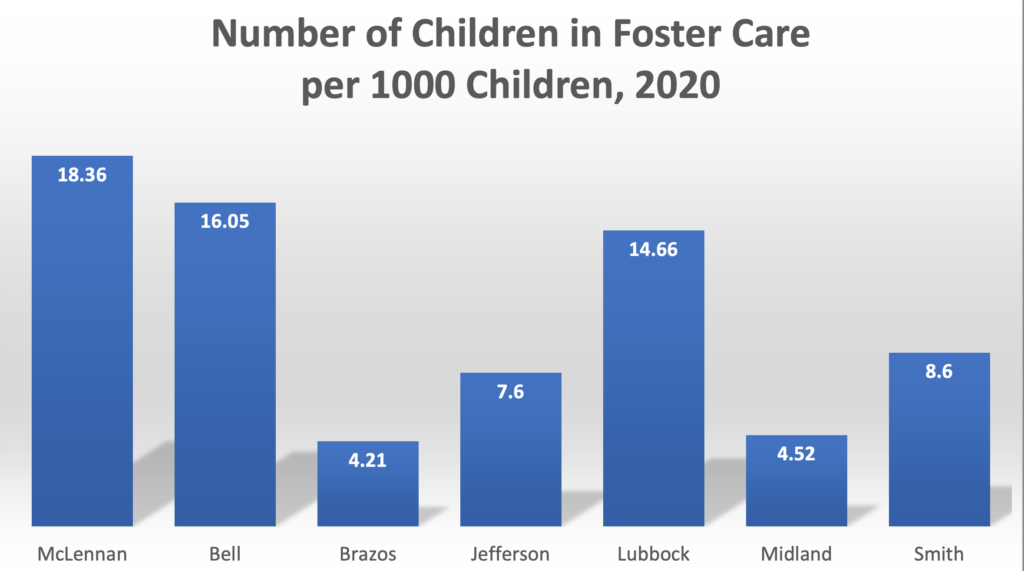
Enough of the numbers; you get the picture. Families need help, and the children in those families need help. Leaders in McLennan County have come together to pursue solutions — stress on the plural “solutions.” These things will not be improved overnight, but we have a lot of good people who care about pursuing that improvement.
If you would like to be involved, contact me at [email protected].
The data was compiled by Jeremy Rhodes of Prosper Waco from the Texas State Department of Family and Protective Services Data Book.
Ferrell Foster is senior specialist for care and communication with Prosper Waco. He is also acting executive director of Act Locally Waco.
The Act Locally Waco blog publishes posts with a connection to these aspirations for Waco. If you are interested in writing for the Act Locally Waco Blog, please email Ferrell Foster at [email protected].
By Ferrell Foster
Doing family is not easy. Families have struggles. Anyone who grew up in a family — all of us — know this truth. But sometimes those struggles become so difficult or dangerous that children need to be protected. That’s when the state steps in, and that’s when the whole community needs to step in, as well.
Forty-two leaders in McLennan County met Sept. 24 to form a new strategic working group — the Families & Foster Care Coalition. Waco Mayor Dillon Meek provided the impetus for this meeting, asking Prosper Waco to convene those who are working in varied sectors to address the challenges faced by families and children in foster care.
Texas is in the midst of a crisis related to foster care, and Waco is no exception. Children are having to spend the night in local Child Protective Services offices because there are no places to take them. This is not the fault of CPS and its workers; it is caused by inadequate human, community, and financial resources.
Local leaders, however, are committed to disrupting the status quo; they believe we can do better if we work together. It is uncertain exactly what varied actions this new coalition will pursue, but we are rising up to make a difference.
Anna Futral, executive director of CASA of McLennan County, has agreed to chair the coalition’s steering committee. Anna has been seeking such community-wide action for some time and is well-prepared to lead. (CASA stands for Court Appointed Special Advocates. CASA trains volunteers to advocate for abused and neglected children in the foster care system.)
It is tempting to think of these issues as only a state government matter, but government agencies are not families, and these kids need families and all the care that should go with such relationships.
State-approved families that can provide foster care step into the gap. They become a child’s new place of safety and nurture for varied amounts of time as issues with the families of origin are worked out. But foster families and families of origin need support from community networks.
In addition to the state agency services and families providing foster care, there is a critical legal system to protect the rights of children, parents, and other relatives. Judge Nikki Mundkowsky and Judge Gary Coley are two who seek to guide this court system with eyes on both legal matters and human concerns.
Then multiple attorneys provide the proper legal representation to the children and families.
In short, it is a multifaceted system that seeks to look after the needs created by families and children in crisis. In Greater Waco, leaders realize we need a more cohesive response to the situation. We need more communication, planning, and implementation. We also need more people and organizations to work together for these children and families.
If you or your organization would like to become involved in this collaborative effort, please reach out to me via email — [email protected].
As an African proverb says: It takes a village to raise a child.
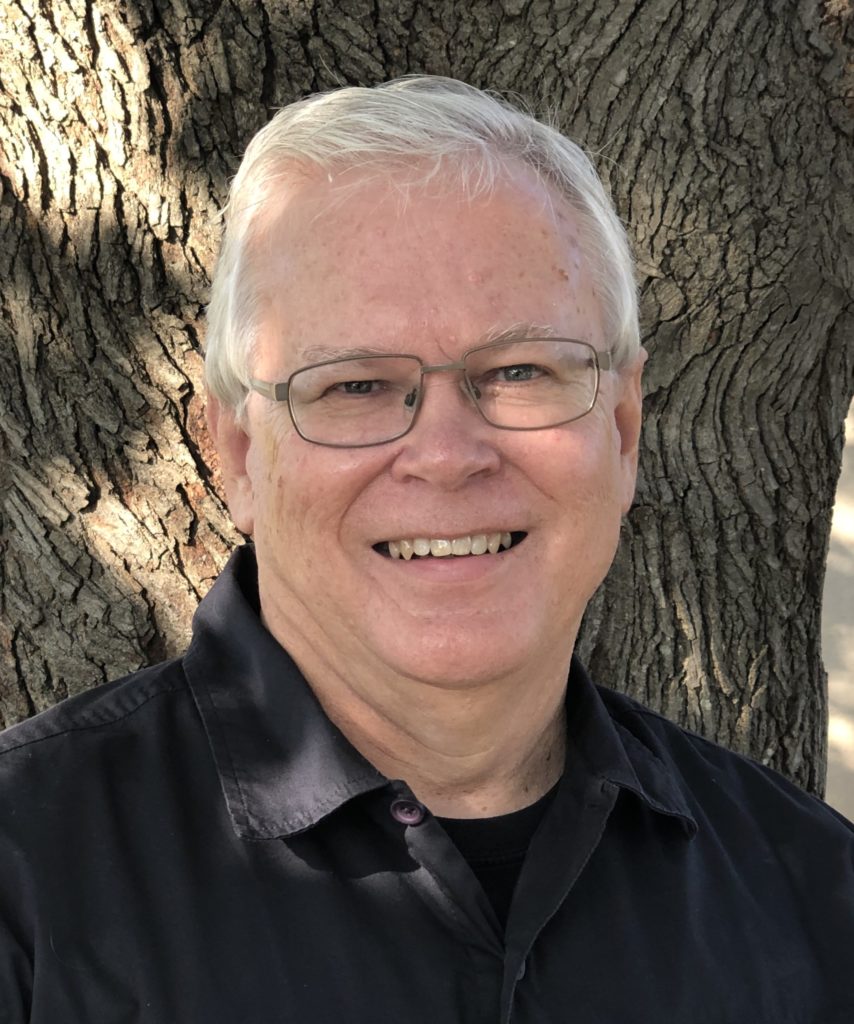
Ferrell Foster is senior specialist for care & communication with Prosper Waco. He is also acting executive director of Act Locally Waco.
The Act Locally Waco blog publishes posts with a connection to these aspirations for Waco. If you are interested in writing for the Act Locally Waco Blog, please email Ferrell Foster at [email protected].
By Tiffani Johnson
United Way of Waco-McLennan County is releasing a child well-being report. It is a research study to support the improvement of well-being for McLennan County’s children and families.
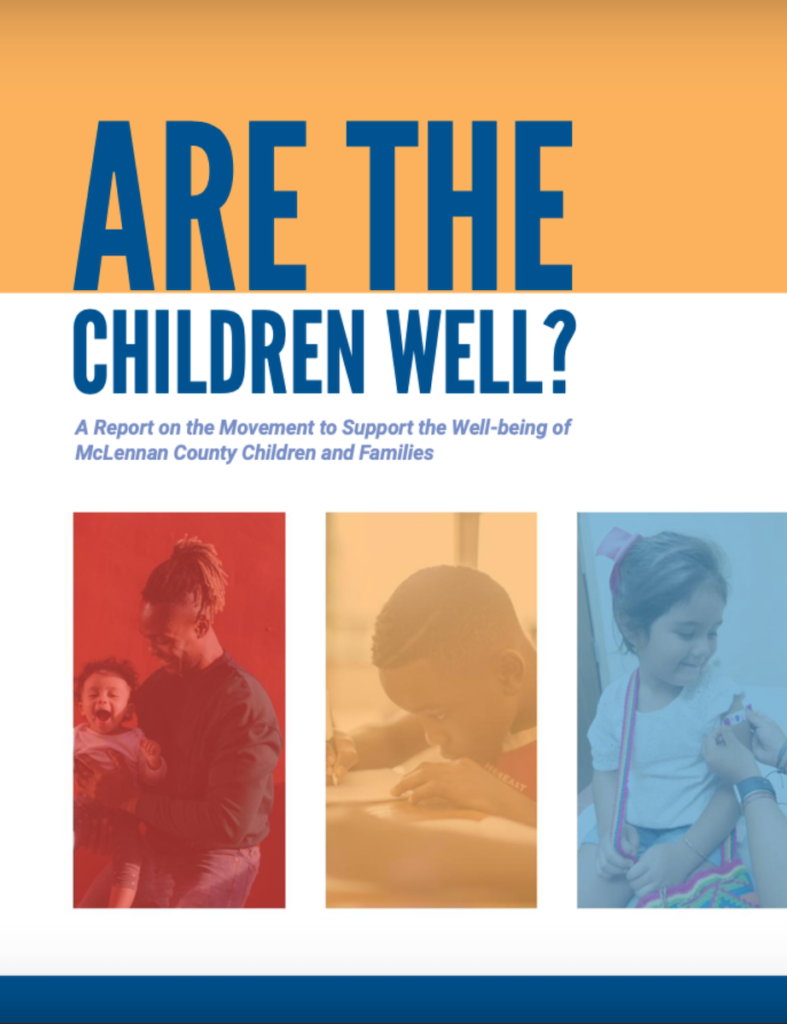
The McLennan County Child Well-being Movement is facilitated by United Way and is a partnership of 25 organizations or local residents. Collectively, this movement has identified community priorities to measure the well-being of children and their families. The research has found that roughly 14,000 McLennan County children are believed to be living in communities with low or very low child-well being scores.
Over the past seven months, the Child Well-being Movement has surveyed or interviewed over 600 parents, direct service providers, community members, stakeholders, and advisory committee members in an effort to better understand the child well-being landscape. This includes residents of varying race ethnicity and zip codes within McLennan County.
“The most striking theme we saw from the community conversations is that there are a number of underrepresented communities that have vanished from civic conversations as some have come to believe that their voice is unwelcomed”, stated Tiffani Johnson, senior director of impact and engagement. “The Movement is committed to championing the inclusion of residents within these communities to take part in decision making affecting their health and well-being.”
The organization’s CEO, Wendy Ellis, stated: “We want to extend our sincere thanks to Waco Foundation for funding this work, and for their initial first steps taken with the 2009 Childhood Quality of Life Index report. There is a long-term, demonstrated commitment from this community at-large to truly understand how our children and their families are faring. Our production of this 2020 report is just one step in the journey. We will now move into the next phase of the work, which is to invite those who lent their voice for this research back to the table so that we can collectively build our community’s action plan.”
The City of Waco is one entity that has had a seat at the table from this work’s inception. Deputy City Manager Deidra Emerson said: “COVID has only compounded the disparities and inequities in our communities of low or very low child well-being scores. The City applauds the McLennan County Child Well-being Movement’s effort to truly listen to what the communities have to say. If we are going to implement sustainable change, we need to give sincere credence to the voices of those we seek to serve.”
To learn more about the research findings and key partnerships, visit www.unitedwaywaco.org.
United Way of Waco-McLennan County strengthens the community by mobilizing resources to measurably improve lives. We envision a community where all people have the education, health and financial stability needed to achieve their full potential.
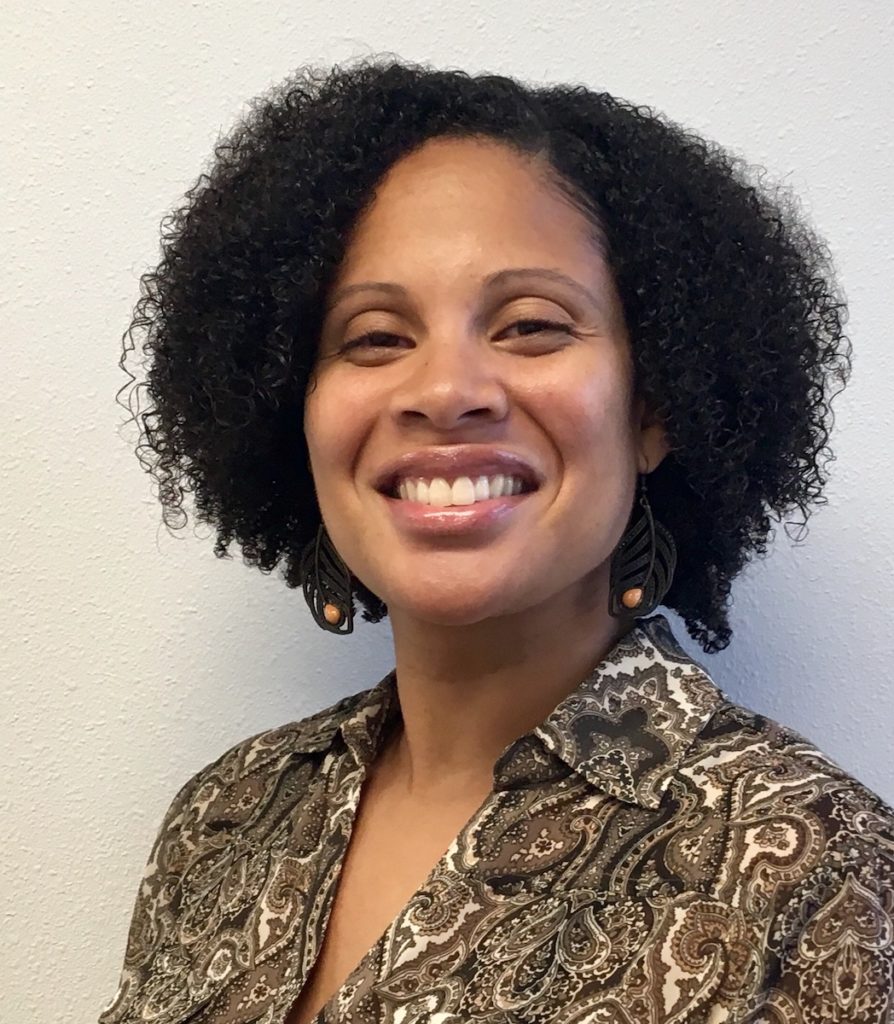
Tiffani Johnson is senior director of impact and engagement for United Way of Waco-McLennan County.
The Act Locally Waco blog publishes posts with a connection to these aspirations for Waco. If you are interested in writing for the Act Locally Waco Blog, please email Ferrell Foster at [email protected].
From your Heart of Texas Region MHMR (For more posts in this series, click here: Mental Health in the Time of Corona Virus)
Children are being flooded with information about the Coronavirus (COVID-19) from a variety of sources. This is a unique situation that may leave parents questioning what to say to their children and how to address the possible emotional fallout from this concerning and anxiety-producing time in our society.
Children need to have important, factual, and appropriate information. They are likely receiving information from peers, adults, social media, and news outlets. We know that not all of this information is accurate. Parents should provide accurate information in an effort to reduce possible confusion, fear and anxiety and to provide reassurance. Be careful not to provide too much information and keep it at a level that the child is able to understand.
Remain sensitive to your child’s mood, behavior, and any noticeable changes in regular patterns such as sleeping and eating. Some children keep their thoughts and feelings to themselves, while others act out their emotions. If you notice changes in your child, encourage them to express their feelings so you can explain and provide support. This provides safety and security for your child in the midst of difficult feelings and emotions.
Continue to have as much structure in the day as your time will allow. Life as your children know it has been disrupted probably more than any other time in their lives. They are not attending school, they may not be seeing friends, sporting events have been cancelled or postponed, and they may be staying home more. Structure can decrease the amount of anxiety a child may be feeling, and give them a sense of control.
Provide children with practices that decrease the chances of getting the virus. Inform your children of the Center for Disease Control’s recommendations on what safety steps can be taken to lessen the spread of the virus (e.g., washing hands frequently, using wipes to clean surfaces, not gathering in large groups, keeping distance from others, using proper means to cover mouth when coughing or sneezing). This will offer children a sense of control over the spread of the virus.
Be aware of your own responses to COVID-19. Children take signals from their parents. Try to be aware of how you are feeling and your own experiences around COVID-19, and how this can affect your child. Speak to a friend, spouse or other trusted person to talk about your concerns and anxieties. Don’t wait to feel overwhelmed by your worries to speak to others. Having ongoing discussion with others will help you with your own anxieties and in not feeling you are alone in your concerns.
MHMR Mental Health Hot line – 254-752-3451 or 1-866-752-3451 – 24 hours a day. For questions related to substance use challenges, call 254-297-8999. Call 911 for a life-threatening crisis.
By Kimberly Trippodo
Thanksgiving 2017 is in the books… even though the “official” day is past, this is still the season of giving and thankfulness.
As a social worker, I consider Thanksgiving a mental wellness holiday, in which mindfulness, gratitude, and positive cognition are prioritized. I work in Special Education; and I am a parent to thoughtful, explorative, kind young man with Autism. Two years ago, around Thanksgiving, I set out on a quest to do a better job of teaching the concept of gratitude to the children with whom I work. My own child was overstimulated by gift giving, which made gratitude during the exchange of gifts even trickier to teach. In turning to the research, obviously and without question, teaching children gratitude is something which requires the adults to demonstrate consistency, lifestyle change, and even a heart shift.
Gratitude Must Be Modeled
A clear theme in the literature emerged and moved me. The key facet to teaching gratitude turned up time and time again as modeling gratitude (Hammer, 2012 & Kupferschmid, 2015). It’s simple but convicting. Maybe my gratitude is not where it should be, which sets a tone for the children around me. I made an effort to count my blessings…yes, out loud. My husband and I thanked each other for the smallest things, to the point of possible ridiculousness. Something happened to my heart: a joy, a lightness, and humor (which I sometimes forget to have) emerged.
Gratitude is an active skill. To be able to look at challenges and say, “Yet I find a reason to have joy and to be thankful,” takes practice, as well as the ability to tolerate distress and develop solutions to overcome. Think about any maneuver learned in an athletic setting. The easiest way to learn a skill is to watch it done by someone more skilled than you and practice it until it becomes a habit.
Gratitude can be even more easily taught when rituals are made of the modeling. Rituals allow extra practice and folding into routine for our children with intellectual or developmental delays. Community service, volunteering, and charitable giving are great rituals to teach gratitude for what one has and the joy of helping others in need. Sharing what one has can diminish materialism (Hammer, 2012).
Many families in my life have dinner table activities such as “Name a high and a low,” which create ritualized discussion of gratitude nightly. The wonderful thing about this approach is it allows for authentic connection and communication to happen in general. Families who engage in this practice are not saying, “we only accept you if you sugarcoat your life.” Families instead allow children to come as their real selves–happy, sad, the range of emotion, and let it be known that their family can handle that conversation. Still, we teach children that even in the challenging times, we can find a reason to be grateful.
Gratitude Happens in Safe Environments
According to research, the other piece to teaching gratitude to children is to give them secure relationships in which to be vulnerable, in which to fail, in which to figure out who they are. All those pieces of knowing themselves, figuring out adaptability, and having healthy relationships with others reduce anxiety and create comfort and safety, so a child can have the space necessary to reflect on gratitude. The more present-minded, mindful, and unhurried we allow our children to be, the more room there is for gratitude to become a part of their thoughts and lives.
Any of us can think about times in life we felt ostracized or rejected. The precariousness of unstable relationships can make failure much scarier. Now, add the helplessness of child’s inability to care for themselves and the need for survival. Abuse, neglect, or trauma make gratitude much more difficult, for very understandable reasons.
The hopeful thing we know from the literature (Ludy Dobson and Perry, 2010 and DuFrense, 2012) is it just takes one stable adult, showing empathy to a child, to build their sense of safety and coping skills in the world. I work in schools, and while many children have secure relationships and loving families, not all of them do. We can all choose to be an adult who shows up in a consistent and warm manner, not allowing a child’s behavior to change the warmth with which we approach them, any of us can be that one secure relationship.
We have a huge responsibility to our kids. Inspiring gratitude takes more than saying, “be thankful,” to our children. It takes adults devoted to living in a state of gratitude. It is our job to model gratitude and foster safe relationships for the children in our lives. With practice, children can understand and even make a habit of this skill.
 Kimberly Trippodo is a Social Worker for Waco ISD. In her spare time, she enjoys writing, anything from fiction, to poetry, to policy analyses, to blog posts. Her other modes of creative expression are culinary concoctions, her violin, and community events. She incorporates art as an expressive outlet in her work with students. She loves all the social and cultural growth happening in Waco, and most weekends, she is out and about in Waco, enjoying the city with her husband and son. You may reach her at [email protected].
Kimberly Trippodo is a Social Worker for Waco ISD. In her spare time, she enjoys writing, anything from fiction, to poetry, to policy analyses, to blog posts. Her other modes of creative expression are culinary concoctions, her violin, and community events. She incorporates art as an expressive outlet in her work with students. She loves all the social and cultural growth happening in Waco, and most weekends, she is out and about in Waco, enjoying the city with her husband and son. You may reach her at [email protected].
The Act Locally Waco blog publishes posts with a connection to these asirations for Waco. If you are interested in writing for the Act Locally Waco Blog, please email [email protected]pirations for Waco. If you are interested in writing for the Act Locally Waco Blog, please email [email protected] for more information.
References:
Baumgartner, Audra. 2013. “Teaching Kids Gratitude and Empathy Year-Long.” Pediatric Safety. https://www.pediatricsafety.net/2013/11/teaching-gratitude-empathy/
DuFrense, Susan. 2016. “Safe Adults & Creating Compassionate Schools Parts 1-4” Living in Dialogue. http://www.livingindialogue.com/
Hammer, Connie. 2012. “Growing Gratitude in Children With or Without Autism.” Parent Coaching for Autism. http://parentcoachingforautism.com/growing-gratitude-in-children-with-or-without-autism/
Kupferschmid, Sarah. 2015. “Gratitude, Autism, and ABA.” Behavioral Science in the 21st Century. http://www.bsci21.org/gratitude-autism-and-aba/
Ludy-Dobson, Christine and Perry, Bruce. 2010. “The Role of Healthy Relational Interactions in Buffering the Impact of Childhood Trauma.” Working with Children to Heal Interpersonal Trauma: The Power of Play. https://childtrauma.org/wp-content/uploads/2014/12/The_Role_of_Healthy_Relational_Interactions_Perry.pdf
